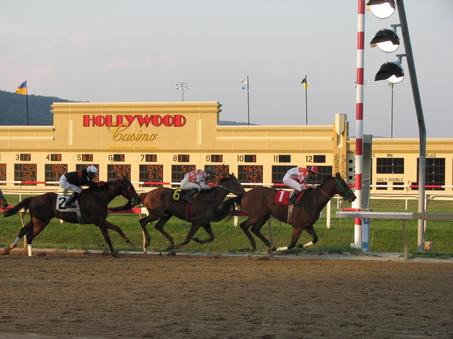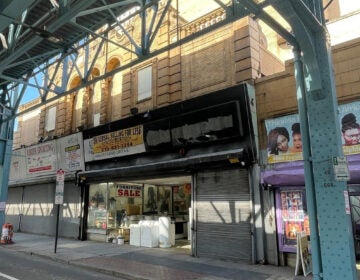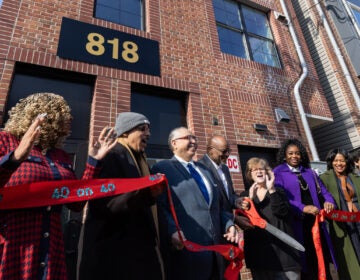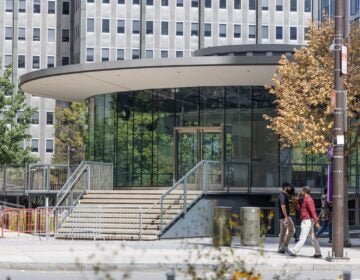Gaming: A view from the man in the street

April 15, 2009
By Thomas J. Walsh
For PlanPhilly
HARRISBURG – Last week, in this state government nerve center that is also a town decaying like a flood-damaged floor, with a magnificent river running through it and hundreds of thousands of jobs in its wake, with one of the most ornate statehouses in the nation encased in a periphery of dead mills, a couple of retired gents on folding chairs outside a convenience store managed to bring the day’s events into perspective.
It was Wednesday, April 8, and a torrent of emotion was about to pour forth from Philadelphia area anti-casino groups in a special auditorium, set up a block away from the state capitol building, in anticipation of their right to assemble and voice outrage.
Philadelphians in Harrisburg, one reads often, are not exactly welcomed with open arms. It’s usually with respect to politicians, or their aides, a minority of whom traipse around the banks of the Susquehanna like they own the place. A generalization? Absolutely, said the two guys who’ve seen a thing or two.
“Good for them,” one of them said, of the protesters arriving en masse from Philly as we spoke. “Got a right to,” said the other. Which of the two said what was tough to distinguish, as both remarks were uttered at the same time, while one was nursing a slim cigar and the other still finishing breakfast.
William Shelley, 66, is a retired steel worker. His buddy Frank Gamble, 67, is a retired construction worker. Gamble used to love to bet the ponies at the nearby Penn National racetrack, some 18 miles north of Harrisburg in Grantville. Shelley still does, now and then. The place, since February 2008, is now known as the Hollywood Casino at Penn National Race Course, and has more than 2,000 slot machines in addition to the race book. It operates four off-track betting facilities throughout central Pennsylvania.
“People who live here work there, and they are just so nice,” Shelley said. “They treat you great. I’ve been going there for 30 years to the racetrack.”
Shelley said that since the slots came, there have been “more horses, better horses, bigger purses and better payouts.” His only gripe about the horseracing was that the track used to have a “scratch hoteline” – a number you could call to hear which mounts were pulled from scheduled races – but it was eliminated once the slots came.
“Don’t know,” he answered, shaking his head, when asked why they would do that.
“I was tempted to go sit at those slots, but I just like the races. My mother likes them (the slots).” He chuckled a bit and shook his head. “She’s 87 and will sit there, oxygen tank and all…”
Shelley said he goes to the track about once a month. His habits have not changed much since the slots came, but said he has friends who are a bit more enthusiastic since its big makeover. They used to frequent horseracing tracks in Maryland and Delaware, he said, especially after racetracks in those states acquired slots.
“They’d take weekend trips down there,” Shelley said. “Now they use their weekends other ways, and they go here [Hollywood Casino at Penn National] on weekdays. They don’t ever go out of town to the track anymore.”
That’s music to the ears of any lawmaker, two blocks away, who helped usher in the legalization of up to 60,000 slot machines across the Commonwealth in 2004, with much of the rationale aimed at saving Pennsylvania’s suffering racetrack industry. Without “racinos” of our own, the thinking went, it was a safe bet that not only horseracing livelihoods, but ever-decreasing agriculture jobs, would disappear faster than a $20 roll of quarters into a Wheel of Fortune one-button bandit.
Since the first of these opened (Mohegan Sun at Pocono Downs in November 2006, followed shortly after by Philadelphia Park Casino & Racetrack that December, and Harrah’s Chester Casino & Racetrack in January 2007), only one of the seven slots parlors opened in the Keystone State is not attached to a racetrack.
The fortunes of those employed in the horse trade, though, from stable cleaners to jockeys to groomsmen to thoroughbred owner-syndicates, are of no particular concern to either side of the Quaker City casino divide. Both major casinos slated for the city of Philadelphia – the source of that day’s highly contentious presentations – are slots-only. There are currently three off-track betting parlors within the city limits: South Philadelphia, Center City and Northeast Philadelphia.
“As long as you have discipline, and you’ve got two incomes in your family, you’ll be fine,” Shelley said of playing the slots. “I know people who go out there two, three, four times a week.” The shift on his face, from a smile to tight disapproval, signified unspoken anecdotes.
Gamble (yes, that is truly his name), was a foreman during the building of the Three Mile Island nuclear plant in the 1970s. Back then, especially, he was flush, he said, and used to go to the races often.
“They broke me of that bad habit,” Gamble said, gruffly, politely declining to elaborate. “My daughter goes out there [to Hollywood].” He slowly shook his head, disapprovingly. “Everything is in their favor. No way you can pull that machine and expect to come out of there with money in your pocket.”
“It’s easier when you’ve got that paycheck coming,” said Shelley, about race betting. “Now [that I’m retired], if I lose $80 or $90, it’s like losing $300 when I was working.”
“You can have fun out there without gambling,” he added, citing the new restaurants, bars and ice cream stands, along with a generally cleaner and better maintained facility. “But it’s gonna be them that gets your money in the end.”
Casino owners and would-be operators can only embrace such a sentiment, especially from a guy who would probably attend the races once or twice more a year if his old scratch hotline were re-established in some form. The old saying, echoed by none other than Steve Wynn on “60 Minutes” this past Sunday evening, is, “the only way to win at a casino is to own it.”
Overall, Shelley said he believed the addition of the slots is a positive for the Harrisburg area: “It brings jobs. I don’t necessarily care for the kind of jobs they’ve got, but the people who have them are grateful for them, and it puts money in their pocket and money into here,” he said, gesturing to the city of Harrisburg at large. “They’ve now got people coming down from New York, from Philadelphia … Maryland. There are a bunch of new businesses because of it.”
“Now the Atlantic City people, they say they’re hurting because of this. So now I wonder what will happen when they get the video poker in bars. Then these casinos [in Pennsylvania] will say they’re hurting!”
Things went back and forth for a few minutes, the two men talking of pros and cons about casinos, horses, slots. Seemed like it was Shelley, by more than a nose, outpacing Gamble, in the pro versus con race. Admittedly, these things are often skewed by the presence of a reporter, especially one from out of town, coffee-stained and caffeinated at an unnatural time of day (8:30 a.m.), scribbling notes on a pad.
But what’s this? A tie-breaker? If only. Still, Cindy Sills, 45, employed by the state Liquor Control Board, just next door and coming into the store on a coffee break, was beckoned to by both men as a friend who could also shed some light on the new Palace That Prints Money less than 20 miles away.
Sills reluctantly said she had been out to play the slots “four or five times” – girls-night-out occasions with friends. Asked if it was a positive or a negative place for Harrisburg and the general region, she hesitated, but then stopped in her sideways advance toward the store entrance.
“I would think it’s pretty positive,” she said. It’s a chance to see live bands, go to nice restaurants, be with friends. “I’ll go again, yes.” So far, at least from slots play, she’s in the black, Sills said, estimating she’s “probably won a couple hundred dollars.”
There were some low-diaphragm guffaws and coughs coming from the two onlookers in lawn chairs when she said that, though clearly Shelley and Gamble thought highly of their friend.
She acknowledged them and smiled, resuming her path to the store, unaware of the reason for the reporter’s presence.
So it was startling when she said, with a bounce, “I’m ready to go to the ones in Philly, too! That’s next.”
Contact the reporter at thomaswalsh1@gmail.com.
PlanPhilly, April 8, 2009: http://www.planphilly.com/node/8641
WHYY is your source for fact-based, in-depth journalism and information. As a nonprofit organization, we rely on financial support from readers like you. Please give today.






